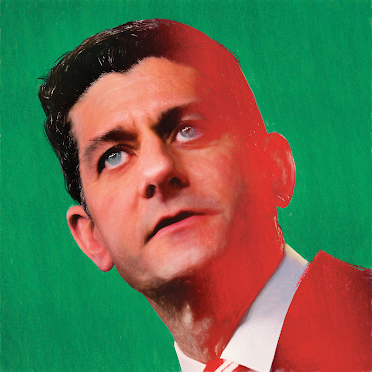Paul Ryan, one-time Speaker of the House of Representatives, has engaged in one of those "Talk" dialogues with David Marchese of The New York Times. That is Ryan, by the way, not Marchese, who is pictured above.
In his recent conversation with Marchese, Ryan opines that we have come to a time of "polarization fatigue," which means, Ryan says, that "voters are going to eventually reward problem solvers."
According to Ryan, "politics is supposed to be about ideas, principles and policies, and it should be aspirational and optimistic." Instead, he says, "we’ve gone in the opposite direction. Politics has become more performance art than persuasion."
Despite Ryan's high-minded description of what politics is supposed to be all about, there isn't much recent evidence that anyone is thinking of politics as "aspirational and optimistic," or that any person of political prominence is trying to achieve a politics that is basically about "principles and policies."
President Joe Biden might be an exception to what I have just said - and the president has definitely positioned himself as a "problem solver." If Biden wins a second term, that could validate Ryan's thesis, but Ryan is definitely not rooting for any Democrat, you can be sure of that, no matter how much a Democrat might be able to solve problems, or to articulate a politics that is "aspirational and optimistic."
Ryan, in other words, is giving us his version of what politics is "spozed to be," and as I read between the lines, Ryan is stumping for Ron DeSantis (the "problem solver" he'd undoubtedly support), and is attempting to down-rate Donald Trump (our former president, who is nothing if not a "performance artist"). I deduce that Ryan thinks (and I hope correctly) that Trump would lose, if he runs again. Ryan's prediction that things are going to change, soon, and that voters are going to "reward problem solvers," is one of those "here's the way it's spozed to be" statements that is actually trying to advance the Republican Party's presidential chances by backing DeSantis over Trump.
In something of a contradiction to what Mr. Ryan is presenting, I would like to suggest that our current politics needs to be considered in light of another "P" word. Politics is, very significantly, about "power," and that is, in fact, the way it's supposed to be.
There are lots of possible things that we can do, collectively, and people have very different ideas about what would be the right thing to do. They also have very different "interests." As an "aspirational" goal, wouldn't it be great if we could have health care for all? Well, of course, it would (and of course we could). However, we would need to pay for that, and that would require taxing the people with the money to get the money to spend on our "aspirational" health care objectives. President Biden's recently-announced budget, in fact, would raise taxes on the wealthiest part of the population to insure that Social Security and Medicare remain solvent, and continue to help those who really need them. You can bet that Paul Ryan is not arguing for Biden's suggested spending (and taxing) plans.
Given that we have different opinions on what we should do, collectively, "politics" is the process by which we make decisions about what we are, collectively, actually going to do. We take political action through various mechanisms (which centrally involve voting and elections), and the outcome of our political decision-making is to give "power" to people whom we think will enact the policies, and follow the principles, the majority prefers.
In recent times - let's say since the election of Ronald Reagan as president in 1980 - our governmental policies have generally conformed to what the giant corporations and the extremely wealthy have wanted. Favoring the interests of the wealthy has been a project of both the Democrats and the Republicans. Political "polarization," which has so fatigued the general public, has actually reflected a "feature," not a "bug." Making people tired of politics is good for all those who represent the corporations and wealthy. The idea is to make ordinary people so tired of politics - and so repulsed by politics - that they decline to participate. The corporations and the wealthy don't have to participate; they hire lobbyists to do that!
Ryan identifies "polarization fatigue" as a significant political problem - and I, personally, would agree with that - but what side is Ryan on?
Let us not be fooled! We live in a political world. If ordinary people abandon politics, because they are tired of how horrible it is, and if ordinary people don't focus on using their potential political power to achieve policies and principles that will serve their interests, and that will enact policies that will provide them benefits, we are going to keep getting the kind of politics we have been getting.
Those disparaging our current president, a president who does appear to be trying to solve some real problems for those who have been cut out of the prosperity achieved by "the billionaire class," need to think carefully about whether or not Paul Ryan is really going to dispense any political advice that will help advance either the principles or the interests of those who are not extremely wealthy.
Think Ryan has all of our best interests in mind? I don't think so!
Image Credit:
https://www.nytimes.com/interactive/2023/03/06/magazine/paul-ryan-interview.html

No comments:
Post a Comment
Thanks for your comment!